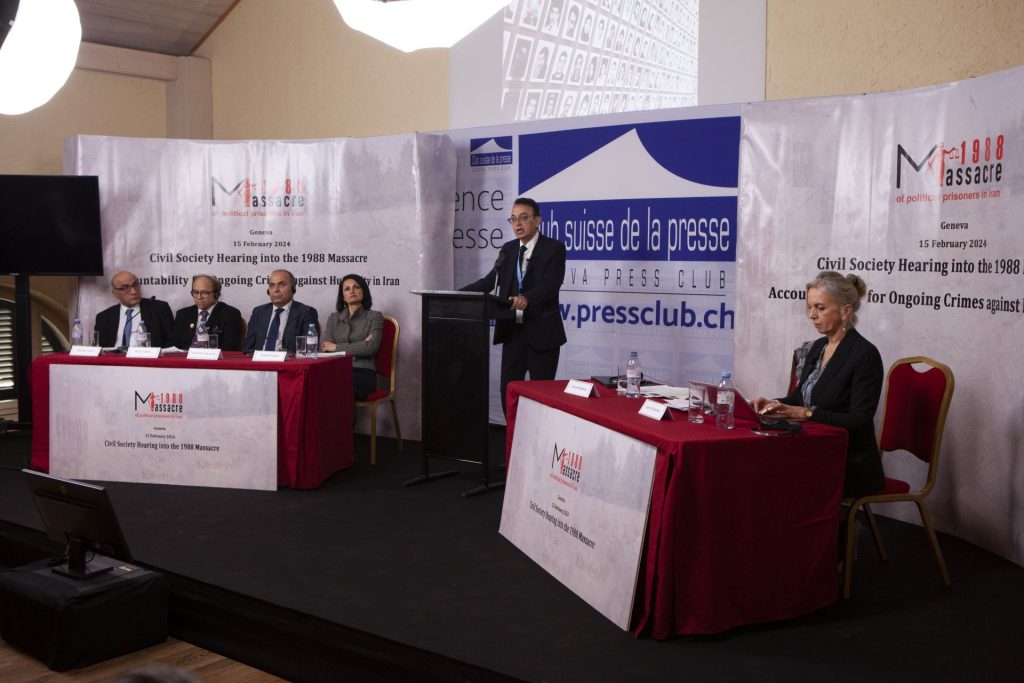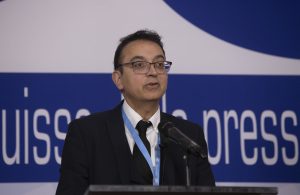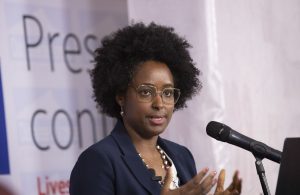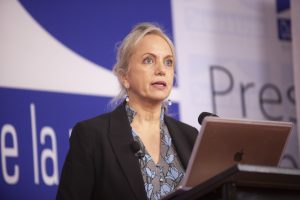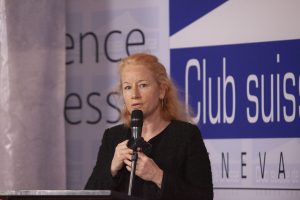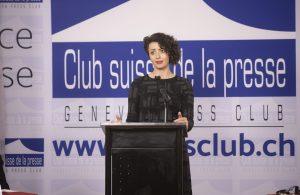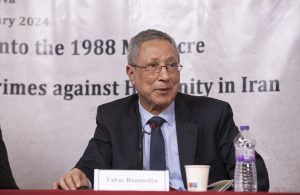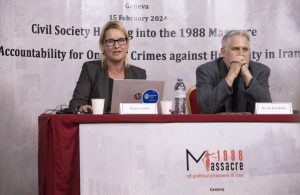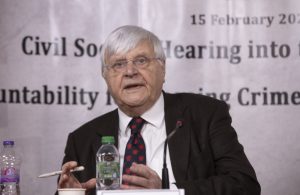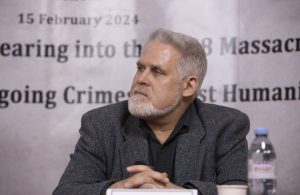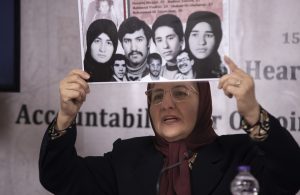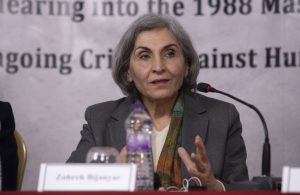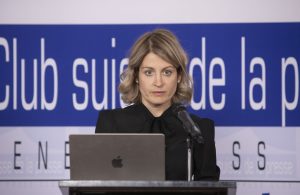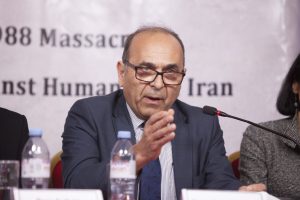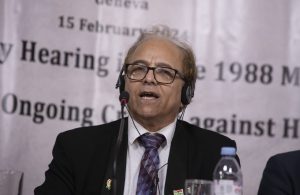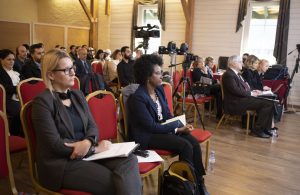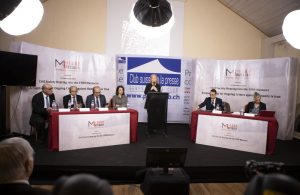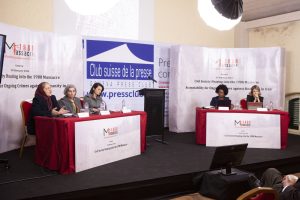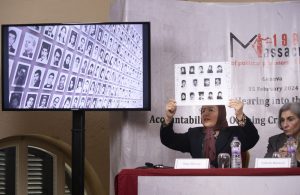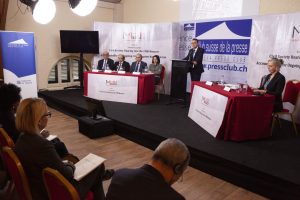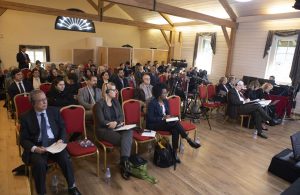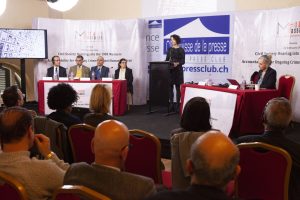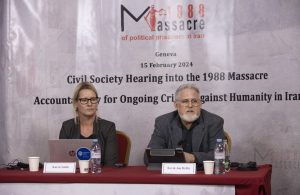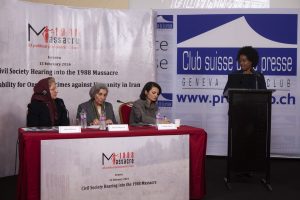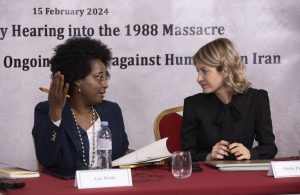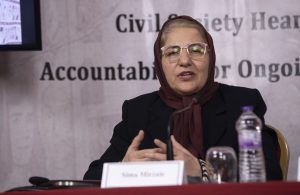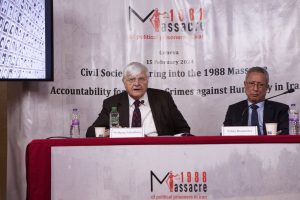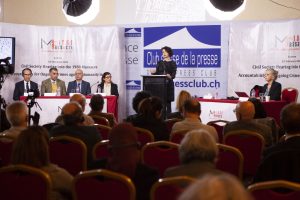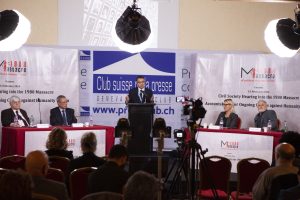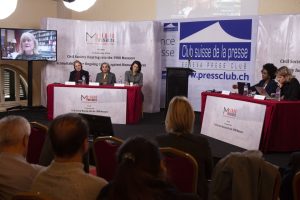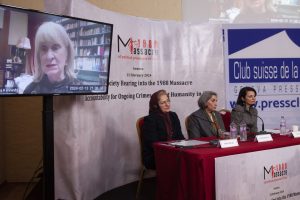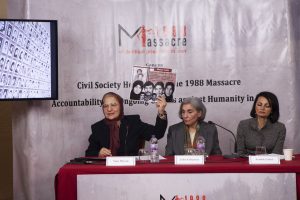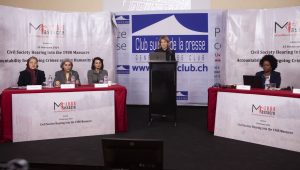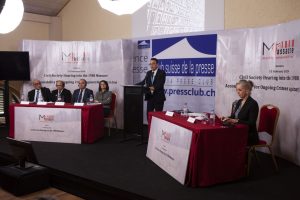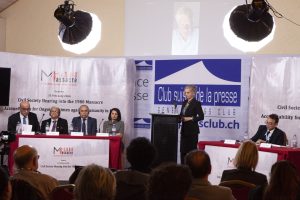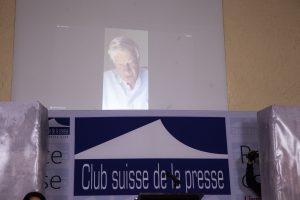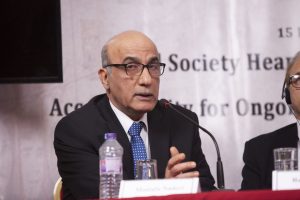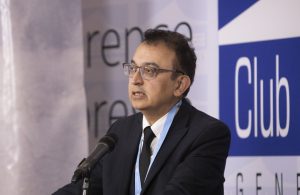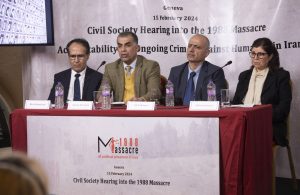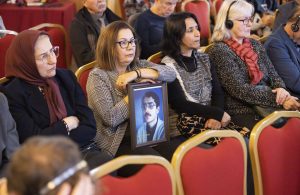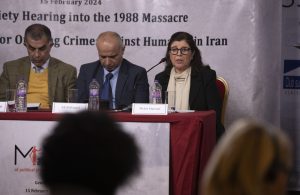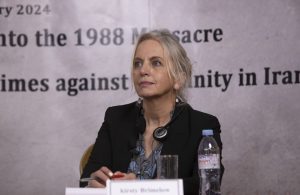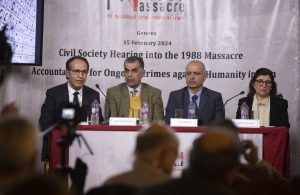Geneva, Switzerland, 15 February 2024 – The United Nations Special Rapporteur on the situation of human rights in Iran and the Chair-Rapporteur of the UN Working Group on Enforced or Involuntary Disappearances joined international experts and survivors of the 1988 massacre and victims’ families in calling for an independent international inquiry into the mass extra-judicial executions and enforced disappearances of thousands of political prisoners in Iran.
At a civil society hearing at the Geneva Press Club, organised by Justice for the Victims of the 1988 Massacre in Iran (JVMI), survivors of the 1988 massacre and victims’ families were able to give evidence to the UN Special Procedures at a public event regarding the extrajudicial executions and enforced disappearances of their friends and loved ones for the first time after 35 years.
Witnesses who gave evidence included nine survivors of the 1988 massacre, three relatives of victims of the 1988 massacre, one activist in Iran who was recently arrested for taking part in anti-government protests, and the father of a protester who was killed by the authorities – the latter two sending their video testimonies from inside Iran.
International experts who addressed the hearing included Javaid Rehman, UN Special Rapporteur on the situation of human rights in Iran; Aua Baldé, Chair-Rapporteur of the UN Working Group on Enforced or Involuntary Disappearances (WGEID); Karen Smith, UN Assistant Secretary-General and Special Adviser of the Secretary-General on the Responsibility to Protect (2019-2021); Raha Bahreini, Amnesty International’s Iran Researcher; Geoffrey Robertson KC, former President of the UN Special Court for Sierra Leone (SCSL); Baroness Helena Kennedy KC, Director of the International Bar Association’s Human Rights Institute (IBAHRI); Kevin Jon Heller, Special Adviser on War Crimes to the Prosecutor of the international Criminal Court; Wolfgang Schomburg, Judge of the UN International Criminal Tribunal for the former Yugoslavia (ICTY) (2001-2008), former Judge of the UN International Criminal Tribunal for Rwanda (ICTR), and Judge of the Federal Supreme Court of Germany (1995–2000); Kirsty Brimelow KC, barrister and former Chair of the Bar Human Rights Committee of England and Wales; Sheila Paylan, former Human Rights Officer and SGBV Specialist at the UN human rights office; and Tahar Boumedra, JVMI Director and former Chief of the UN Human Rights Office in Iraq.
Ambassadors and experts from over a dozen Permanent Missions, observers from the Office of the UN High Commissioner for Human Rights and various UN Working Groups, and human rights advocates and NGOs attended the hearing.
The perspective of the UN Special Rapporteur on Iran
Special Rapporteur Javaid Rehman told the event: “In 1988, thousands of these prisoners were extra-judicially executed, pursuant to a fatwa issued by the then Supreme Leader of Iran and implemented across prisons in the country”.
“There are extreme concerns, and indeed, overwhelming evidence, as we are hearing, that serious crimes under international human rights law and international humanitarian law have been committed. These crimes include the crimes against humanity of torture, of persecution, of murder, of extermination, of enforced disappearances, as well as the crime of genocide.
“This massacre has been followed, as we’ve heard, by the state authorities refusing to publicly acknowledge the killings, and a failure to disclose the fate of those killed, and the location of their remains to the victims’ families, and subjecting these families to threats, harassment, intimidation, and attacks. There has thus been the determination of the Iranian government to hide these massacres through false narratives and statements, distortion of historical data, and active harassment of survivors and family members of the victims, as well as by hiding the evidence, such as the destruction and desecration of mass graves.
“Systematic concealment of the fate of the victims, not providing the location of their remains, or not providing family members information about the causes of death is deeply troubling and distressing. Such concealment, in my view, ladies and gentlemen, constitutes enforced disappearances and a crime against humanity.
“After the 1988 massacre, Khomeini’s willing executioners who had ordered these mass arbitrary executions were indeed rewarded and were promoted to high positions in politics, in the judiciary, and within the judicial and domestic framework of the country. As we know, many of these remain in that high-powered position as of today. The current Iranian President acted as a member of the Death Commission, and many witnesses have already made reference to his role in the mass executions of 1988.
“Justice demands accountability for the actions of Mr. Raisi and all members of the Death Commission, as well as those who have been involved and who have committed these egregious crimes, these unforgivable crimes in international law. I urge the international community to act and to act now.
“I implore upon the international community, in particular members of the Human Rights Council, to listen to the voices, to the pain and grief of the victims and survivors of the 1988 massacres, and to act judiciously, but decisively, to ensure justice and accountability fully in accordance with international law, and respecting the right to a fair trial.”
Prof. Rehman called on the international community to establish an “international investigative mechanism or an international commission of inquiry to ensure accountability, but also to establish the truth and ultimately justice for the victims of the 1988 massacres.
“I join you in our support for the victims of the 1988 massacres, their families, and survivors, for our common endeavour to demand justice and accountability and an end to the prevailing culture of impunity. Our human, moral, and legal values and consciences demand that action has to be taken”, he added.
The position of the UN Working Group on Enforced Disappearances
WGEID Chair-Rapporteur Aua Baldé pointed out that in the view of the UN Working Group, the enforced disappearances of 1988 constitute a ‘continuing offence’ for as long as the perpetrators continue to conceal the fate and whereabouts of the persons who were disappeared, and these facts remain unclarified.
“Today’s event reminds us that victims of Enforced Disappearance, including their relatives, have been fighting for justice and for truth for over three decades now, and it’s also an important reminder that impunity continues to prevail”, she said, adding:
“We should all raise our voices and call for justice and accountability for the victims of the 1988 massacre. I hope today’s event, the discussion held and, more importantly, the testimonies heard will remind us of our collective responsibility in the fight for justice for the victims of the 1988 massacre.”
“As a way forward, if you allow me, and within the mandate of the Working Group, I would like to invite the families who have not registered the cases with the Working Group to do so, because as I referred earlier, our numbers are very low, but the cases are still out there, and we would like to register them under our humanitarian mandate”, she emphasised.
The view of international experts
Former UN Assistant Secretary-General Karen Smith said the evidence shows that the 1988 massacre constitutes crimes against humanity, adding: “While holding those responsible for committing these crimes is a matter of principle and something that is owed to the victims and their families, it is also significant in terms of the broader cycle of human rights violations which may amount to atrocity crimes, their recurrence, and their prevention”.
“While the member states of the Human Rights Council have heeded calls by civil society to establish a Fact-Finding Mission into the state-led human rights violations in Iran during and following the 2022 protests, it is important that these events not be seen in isolation, but as part of a longer trend of human rights violations, some amounting to atrocity crimes, that has been the result of decades of impunity.”
“I therefore want to reiterate the call by human rights experts and civil society groups that the Human Rights Council expands the mandate of the Fact-Finding Mission to include the events that occurred in 1988, or alternatively that a separate UN Commission of Inquiry be established to investigate the crimes committed in 1988 in order to document evidence that could be used in eventual trials”, Prof. Smith added.
Kevin Jon Heller said it could be argued that the 1988 massacre also qualifies as “genocide of a protected religious group.”
“This is, of course, supported by the fatwa itself,” he said, quoting Khomeini’s 1988 fatwa that ordered the massacre: “As the [PMOI] do not believe in Islam … and as they are waging war on God … It is decreed that those who are in prison throughout the country and remain steadfast in their support for the [PMOI] are waging war on God and are condemned to execution.”
Prof. Heller point out that insofar as the 1988 massacre can be described as an act genocide, all 152 states other than Iran that have ratified the Genocide Convention could bring a case against Iran to the ICJ.
“I believe that the genocide question, though not easy, is close enough that the ICJ would likely be willing to accept a case accusing Iran of being responsible for genocide. A state would have to bring the case – individuals do not have that right – but if one could be found, it could request the Court impose what are called Provisional Measures until a final decision was issued”, he said.
“Such provisional measures could include, among other things, ordering Iran to prosecute the perpetrators of the 1988 massacre and to release all of the information it has on the victims of the 1988 massacre – particularly the location of where the dead are buried”, Prof. Heller added.
Former UN Judge Geoffrey Robertson, speaking via a live Zoom connection from Melbourne, Australia, told the event: “Prisoners are the most vulnerable of all people. They are at the mercy of the state. And that is why international law is particularly concerned for them and why it is so outrageous to treat them in the way these prisoners were treated. Many of them were associated with the MEK, which was a political organisation, and which theologically was at odds with the religion, the theology of the mullahs, of the Ayatollah, of the regime that had taken over in 1979”.
Reading out the translation of a passage from Khomeini’s 1988 fatwa ordering the massacre, British barrister Kirsty Brimelow KC pointed out “there was not even a pretence of due process”.
“In order to carry out the killings, Khomeini set up set up what were called Amnesty Commissions, but they very quickly became known as Death Commissions by the prisoners, and as the decades have gone by, more information has been gathered which shows that those Death Commissions were not just in Tehran, as was first thought, but were in fact in more than 70 provinces and towns across Iran, and around 30,000 men, women, and children were extrajudicially killed over a short period of two or three months”.
IBAHRI Director Baroness Kennedy KC argued via a video message that the 1988 massacre represents a “wound in the history of Iran” that requires accountability.
“One of the things that we have to be doing is calling for those who were involved who are still alive to be facing trial. They should be facing processes for what they did, and they should be on long lists of sanctionees, unable to travel. They shouldn’t be able to send their children to universities in the West, whether they be Oxford or Harvard, and so on, as they indeed managed to do somehow. It shouldn’t be possible for them to still enjoy those freedoms when so many others don’t.”
She added: “I think that we have to be calling upon nations like my own, Britain, to expand its universal jurisdiction, so that the crimes for which people can be committed as they transit through Britain, or when they come here on vacation, or for all manner of reasons, to look after their assets, they keep outside of the country, which, indeed they do. We should make sure that they can be arrested and people who have been involved in these terrible crimes and in the 1988 massacre should be brought to justice, even if it will not happen in their own jurisdiction, it has to be promised that it will happen if they come anywhere near nations which respect universal jurisdiction, and have created domestic law to be able to deal with those who are criminals, who have committed terrible crimes in other countries, especially in this instance we’re talking about in your country, in Iran.”
Former UN Judge Wolfgang Schomburg called for the establishment of an international tribunal to hold accountable the perpetrators of the 1988 massacre.
“It is my firm belief that when we believe in peace in the future, then we must intervene when we see a crime. If you see a wrong, you must right it. There is this fundamental saying, the basis for not only international law but for justice in general, that there is no peace without justice and no justice without truth”, Judge Schomburg said.
Judge Schomburg pointed out that when he helped prepare the first draft of the articles of the International Criminal Court, “nobody would have dreamt that there would be once a real existing international criminal court and that many of us would sit there as judges. I think it’s reason enough to be optimistic for the future”.
Sheila Paylan told the hearing: “The enforced disappearances connected to the 1988 massacres have also perpetuated a culture of silence and fear. Survivors and families of victims often face harassment, intimidation, or even worse, if they try to seek answers or call for accountability. The impact of these disappearances then goes beyond the immediate victims and their families. It affects Iranian society as a whole”.
“More recent events in Iran remind us of the consequences of unchecked power and the importance of safeguarding human rights. The legacy of the 1988 massacres underscores the need for transparency, accountability, and justice in addressing past atrocities, without which the cycle of violence and repression will surely continue”, she added.
JVMI Director Tahar Boumedra described the challenging task of achieving justice for the 1988 massacre. “When we started this in 2016, we didn’t think that we’ll reach this stage where a lot of issues have been clarified. What we believe is the truth has come out. Is it the full truth? The absolute truth that could be only achieved by an independent international Commission of Inquiry? That international Commission of Inquiry is rejected by the Iranian regime. So, we have to continue convincing not only the United Nations, the Human Rights Council, but also the diplomatic community – because when we talk about diplomatic community, whether we like it or not, this is the reality. The states look for their interests before any issues of human rights and democracy. … And unfortunately, most of the European countries so far, they are showing some kind of complacency towards the regime because there are plenty of other interests that come before the human rights interests.”
“Having said that, I promise you, JVMI will not give up. We will redouble our efforts to make sure that we do work at the level of the diplomatic community. And it’s very important that we invest all our efforts to make sure that there will be a breakthrough through the General Assembly of the United Nations. And there will also be a breakthrough through the application of Universal Jurisdiction”, he added.
Background:
The 1988 extrajudicial executions and enforced disappearances of thousands of political prisoners took place following a decree handed down by Supreme Leader Khomeini. ‘Death Commissions’ were formed across Iran sending political prisoners who refused to abandon their beliefs to execution. The victims were buried in secret mass graves. The perpetrators continue to enjoy impunity. They include Iran’s current President Ebrahim Raisi and Judiciary Chief Gholam-Hossein Mohseni Ejei. Since becoming President, Raisi has stepped up the state’s crackdown on protesters who seek basic freedoms. In recent months, authorities have executed more than a dozen protesters despite repeated international appeals to not do so.
Some of the witness testimonies (in Farsi):

